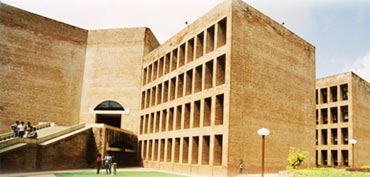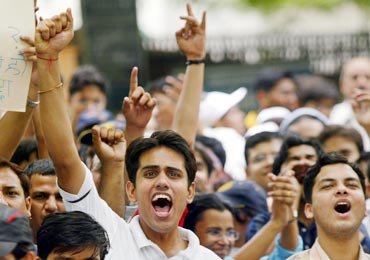Photographs: Pagalguy Lajwanti Dsouza, Pagalguy.com
Six IIM-Ahmedabad students plan to start an anti-corruption helpline to weed out corruption from public life. This comes in the wake of series of scams being unearthed in India in the recent past.
Hello, this is the Anti-corruption Helpline, how may I help you?" This is the line that six second year students of IIM-Ahmedabad are longing to hear soon when their special project on building an anti-corruption helpline becomes real.
Three of the six students presented a paper about it at IIM-A's Confluence 2010 event in the college campus between November 26 and 28, 2010. That the project won the first prize was hardly surprising -- everybody in the audience could relate to it.
In modern India, almost everyone has been the victim of a corrupt government official or department or has at least heard or read about cases.
Click NEXT to read how these six IIM-A students want to convert their idea on paper into a reality.
"PaGaLGuY.com is India's biggest and most trusted MBA preparatory resources website, using technology, community and high quality content to empower the MBA aspirant community."
How these IIM-A students plan to fight corruption
Rampant corruption
In a recent report by Transparency International, India was ranked the 87th most corrupt country in the world among 178 countries. Apparently, the drubbing was because of the image created about India during the Commonwealth Games 2010.
According to Ravi Yadav, one of the students who presented the paper, corruption in India was like second nature to many in authority.
"Whether it is for a driving license or a passport, a bribe is almost taken for granted." This helpline according to Ravi will help those people who are forced to bribe to get their work done.
Ravi gave the example of the process of getting a driving license. "If you pay a bribe you get it in one day but if you don't, you have to wait for three days. Working people cannot take time off from work and make another trip to the RTO (Regional Transport Office that issues driving licenses) office so they bribe, though they may actually not want to."
How these IIM-A students plan to fight corruption
Photographs: Kamal Kishore/Reuters
The team
The six students, which also includes Saurabh Singh, Shantanu Shekhar, Udit Goyal, Nikhil Mudliar and Daniel de Luna were assisted by former president Dr APJ Abdul Kalam and their professor Anil Gupta.
Saurabh told PaGaLGuY that to begin with, the helpline would try to solve problems of corruption only in sectors such as RTO, passport office and simple issues related to the Collector's office.
"We cannot think of bigger issues at this point because that would mean more intricate work involved and much larger infrastructure in place."
Saurabh added that departments such as the RTO or passport office were the ones that the general public were more likely to interface with in daily life.
How these IIM-A students plan to fight corruption
The process
Shantanu told PaGaLGuY that the anti-corruption helpline framework will be a simple one. A call will be processed only if it is found to be genuine -- which means the complaint should make sense and be against a department or government official and the caller should not be a fraud caller wanting to pass time.
The call will then be transferred to one of a set of designated experts who will analyse the call.
Each expert will specialise in analysing a particular type of corruption. "The expert will then liaison with the department or officer against which the complaint has been filed and then work in tandem with the Anti-Corruption department of the state to try to find a solution," Shantanu added.
The team has discussed this idea at different forums before and has already got a huge response and support.
For example, a politician who wants to help put up the helpline has forwarded them to a state department which wants to study the project more and possibly help implement it. The team has found a telecom service provider who wants to provide the toll-free like for the helpline.
The team has also made its presentation to the Gujarat state Anti-corruption Department, which has shown an interest in the model and also pointed out some issues on which more work needs to be done.
How these IIM-A students plan to fight corruption
Photographs: Adnan Abidi/Reuters
There is also talk of keeping a substantial charge for the call -- in the range of Rs 5 or Rs 10 per minute. Ravi justifies that if they do not keep a steep charge for the calls, they will get plenty of frivolous calls from people complaining just about everything.
There is a lot of excitement in the group of six students about the helpline. However, there is still some work to be done before the idea becomes a reality.
First, getting the proper officials to man the helpline. Those who are not corrupt themselves and have the experience and knowledge to deal with such situations.
Second, getting the government and other authorities to provide these experts with rights and the backing to get work done.
Third, the team has to run the helpline model through every legal and administrative checks and processes so that they are fully on the right side of the law, in case something turns ugly.
Fourth is to make sure the infrastructure is in place, both in terms of the technology and the physical space for the officials and call-takers to sit in.
Fifth is to make certain the complete plan is in place before implementation. The time taken to address a complaint, time taken to work on it and also the time taken to solve the case are all systematically planned. All this information has to be in the public domain.
Sixth is to create an exhaustive list of complaints that the helpline will be in the capacity to address.
Seventh, make sure there is ample financial support for the group to be able to pay the salaries of those manning the helpline
Eighth is to be assured of generous help from support groups like the media so that the work gets publicity and enough encouragement to expand to other areas.
Ninth is to make sure the project and the idea are a continuous effort carried forward by the future students of IIM-A, after the founding team graduates.






Comment
article